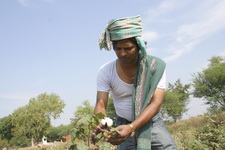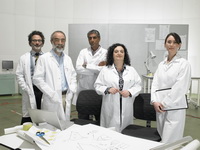A Meta-analysis of the Impacts of Biotech Crops |
 Despite the rapid adoption of genetically modified (GM) crops by farmers in many countries, controversies about this technology continue. Uncertainty about GM crop impacts is one reason for widespread public suspicion. Wilhelm Klümper and Matin Qaim from the University of Goettingen (Germany) have carried out a meta-analysis of the agronomic and economic impacts of GM crops to consolidate the evidences. The analysis covers 147 original studies that were carried out internationally over the last 20 years. On average, GM technology adoption has reduced chemical pesticide use by 37%, increased crop yields by 22%, and increased farmer profits by 68%. Yield gains and pesticide reductions are larger for insect resistant crops than for herbicide tolerant crops. Yield and profit gains are higher in developing countries than in developed countries. The meta-analysis reveals robust evidence of GM crop benefits. Such evidence may help to gradually increase public trust in this technology. Despite the rapid adoption of genetically modified (GM) crops by farmers in many countries, controversies about this technology continue. Uncertainty about GM crop impacts is one reason for widespread public suspicion. Wilhelm Klümper and Matin Qaim from the University of Goettingen (Germany) have carried out a meta-analysis of the agronomic and economic impacts of GM crops to consolidate the evidences. The analysis covers 147 original studies that were carried out internationally over the last 20 years. On average, GM technology adoption has reduced chemical pesticide use by 37%, increased crop yields by 22%, and increased farmer profits by 68%. Yield gains and pesticide reductions are larger for insect resistant crops than for herbicide tolerant crops. Yield and profit gains are higher in developing countries than in developed countries. The meta-analysis reveals robust evidence of GM crop benefits. Such evidence may help to gradually increase public trust in this technology.
|
|
|
|
|
Europe's Leading Plant Scientists Call to Stop Blocking GM Trials |
 More than 20 of Europe's most prominent plant scientists signed a joint letter warning that Europe may lose its research lead unless plant science is adequately funded. The most influential plant scientists from Germany, Switzerland, the United Kingdom, Austria, Netherlands, Belgium, and Sweden are concerned that European basic and applied plant science may be relegated to a second tier status. More than 20 of Europe's most prominent plant scientists signed a joint letter warning that Europe may lose its research lead unless plant science is adequately funded. The most influential plant scientists from Germany, Switzerland, the United Kingdom, Austria, Netherlands, Belgium, and Sweden are concerned that European basic and applied plant science may be relegated to a second tier status.
|
|
|
|
|
BBSRC Scientists Recommend Trait-based Assessment of Biotech Crops |
 The Biotechnology and Biological Sciences Research Council (BBSRC) released a position statement on new techniques on genetic improvement of crops together with GM regulations that can be adopted by the EU. BBSRC recommends trait-based system in assessment of GM crops, instead of focusing on the techniques used in the transformation because the boundaries between established genetic modification (GM) and non-GM techniques will become increasingly blurred as techniques develop. BBSRC also urged policy makers to be knowledgeable about the costs of not introducing proper regulatory processes. The Biotechnology and Biological Sciences Research Council (BBSRC) released a position statement on new techniques on genetic improvement of crops together with GM regulations that can be adopted by the EU. BBSRC recommends trait-based system in assessment of GM crops, instead of focusing on the techniques used in the transformation because the boundaries between established genetic modification (GM) and non-GM techniques will become increasingly blurred as techniques develop. BBSRC also urged policy makers to be knowledgeable about the costs of not introducing proper regulatory processes.
|
|
|
|
|
MPs Visit Biotech Cotton Field in Ghana |
 Ghanaian Members of the Parliament of select committees on food and agriculture and environment and trade visited the Bt cotton confined trial site at Nyankpala in North Ghana to be familiar with biotechnology. The Bt cotton trials is part of Savanna Agricultural Research Institute of the Council for Scientific and Industrial Research (CSIR-SARI) project on the introduction of GMOs and biotechnology products in Ghana. Ghanaian Members of the Parliament of select committees on food and agriculture and environment and trade visited the Bt cotton confined trial site at Nyankpala in North Ghana to be familiar with biotechnology. The Bt cotton trials is part of Savanna Agricultural Research Institute of the Council for Scientific and Industrial Research (CSIR-SARI) project on the introduction of GMOs and biotechnology products in Ghana.
|
|
|
|
|
|
|

|
A biweekly update on gene editing research, regulations, and impact
produced by ISAAA Inc. |
| |
|
|

|
| A monthly update on gene drive research and development provided by ISAAA in collaboration with the Outreach Network for Gene Drive Research |
| |
|
|
|
|
GM APPROVAL UPDATES |
- The Philippines approved the canola event LBFLFK for food, feed, and processing.
- The Philippines approved the cotton event GFM cry1A for commercial cultivation.
- Brazil approved the wheat event HB4 for commercial cultivation.
- The Philippines approved the soybean event GMB 151 for food, feed, and processing.
- The Philippines approved the eggplant event EE-1 for cultivation
- The USA approved the canola event MON94100 for food and feed.
|
|
|
|
| Biotech Updates is a weekly newsletter of ISAAA, a not-for-profit organization. It is distributed for free to over 22,000 subscribers worldwide to inform them about the key developments in biosciences, especially in biotechnology. Your support will help us in our mission to feed the world with knowledge. You can help by donating as little as $10. |
|
|
|
|